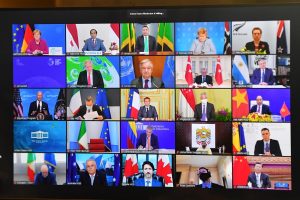
One of my favorite quips from Mark Twain’s The Adventures of Tom Sawyer is when Tom is defined as “a glittering hero…the pet of the old, the envy of the young,” and there were “some that believed that he would be President, yet, if he escaped hanging.” With these few words, Twain captured the essence of leadership in our world. Those who get to the top are the fiercest, most determined, and most ruthless. Today, the latter quality has become so intense that we can no longer believe our leaders, and certainly not trust them to have our best interest in mind.
I am not accusing any leader in particular, or even leaders as a whole. It is simply that in an egoistic world, where people vie to topple one another on their way to the top, the one at the top is clearly the one who trampled over and knocked down more people than anyone else. Concisely, to get to the top in an egoistic world you have to be the biggest egoist.
So how do we know whom to trust? We don’t know and we cannot know. All we know is that we are in the dark.
In a culture of unhinged selfishness, any conspiracy theory seems reasonable, while truth is nowhere to be found. When every person who says or writes something is trying to promote some hidden agenda, you have no way of knowing who is right, what really happened, or if anything happened at all.
The only way to get some clarity in the news and goodwill from our leaders is to say “Enough!” to our current system and build something entirely independent. The guiding principle of such a system should be “information only,” no commentary. Commentary means that information has already been skewed. Information means saying only what happened, as much as possible, not why, and not who is to blame and who we should praise.
Concurrently, we must begin a comprehensive process of self-teaching. We have to know not only what is happening, but why we skew and distort everything. In other words, we have to know about human nature and how it inherently presents matters according to its own subjective view, which caters to one’s own interest. To “clear” ourselves from that deformity, we must learn how to rise above our personal interest and develop an equally favorable attitude toward others. This is our only guarantee that our interpretation of things will be even and correct.
Once we achieve such an attitude, we will discover that the bad things we see in our world reflect our own, internal wickedness. Our ill-will toward others creates a world where ill-will governs, and so the world is filled with wickedness and cruelty. Therefore, all we need in order to create positive leadership—and to generally eliminate ill-will from the world—is to generate goodwill within us. When we nurture goodwill toward others, we will fill the world with goodwill. As a result, the world will fill with kindness and compassion. By changing ourselves, we will create a world that is opposite from the world we have created through our desires to govern, patronize, and often destroy other people.